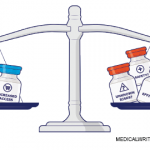NEW YORK (Reuters Health)—Patients with antibodies to infliximab in Remicade should not be switched to biosimilars, researchers warn.
“(The) antibodies will cross-react with the new biosimilar drug, potentially reducing clinical response,” Dr. Daniel Nagore, director of research and development at Progenika Biopharma in Derio, Spain, told Reuters Health by email.
“The study highlights the importance of therapeutic drug monitoring to manage patients switching from the reference molecule Remicade to the recently approved biosimilar CT-P13,” he said. “These findings are in agreement with previously published results in patients with Crohn’s disease and ulcerative colitis.”
Infliximab, a monoclonal antibody that works against tumor necrosis factor alpha, is marketed as Remicade (Janssen Biotech). The biosimilar CT-P13, branded as Inflectra (Hospira) and Remsima (Celltrion), is approved in Europe for use across all indications of Remicade. The U.S. Food and Drug Administration (FDA) has CT-P13 under consideration.
As reported online March 10 in Annals of the Rheumatic Diseases, Dr. Nagore and colleagues reviewed data on 250 adults receiving 3 or 5 mg/kg infusions of Remicade for rheumatoid arthritis or spondyloarthritis. None had been exposed to the biosimilar.
Anti-infliximab antibodies at drug trough levels were measured in parallel with separate enzyme-linked immunosorbent assays (ELISAs) of Remicade, Inflectra and Remsima.
With the Remicade assay, 126 patients (50.4%) tested positive for antibodis—and all were positive for antibodies to infliximab on the Inflectra and Remsima assays.
Positive and negative percentage agreements were 100%, and correlation coefficients were 0.995 or greater in all comparisons. No differences were found between rheumatoid arthritis and spondyloarthritis or between concurrent immunosuppressives.
“Despite approval of CT-P13 by several regulatory agencies, biosimilars still raise safety and efficacy concerns among physicians,” Dr. Nagore said. “One of the main questions was the cross-reactivity of anti-infliximab antibodies. This has now been answered.”
“The impact for patients is very significant. CT-P13 biosimilar uptake in the European Union and other regions is growing. The findings warrant the use of new available drug monitoring techniques in a clinical scenario. Patients will benefit from the best drug and the best treatment strategy by testing their drug and antibody levels,” Dr. Nagore advised.
Dr. Nagore added, “Future studies will establish therapeutic ranges for biologics in rheumatic diseases as are being implemented in other inflammatory disease. This will allow physicians to personalize treatments and increase remission rates.”
The authors reported no funding. Progenika Biopharma employs six coauthors.


